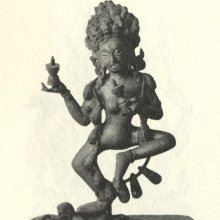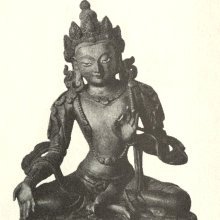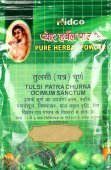Shi, Śī, Śi: 15 definitions
Introduction:
Shi means something in Hinduism, Sanskrit, Marathi, Hindi, biology, Tamil. If you want to know the exact meaning, history, etymology or English translation of this term then check out the descriptions on this page. Add your comment or reference to a book if you want to contribute to this summary article.
The Sanskrit terms Śī and Śi can be transliterated into English as Si or Shi, using the IAST transliteration scheme (?).
Images (photo gallery)
(+257 more images available)
In Hinduism
Vyakarana (Sanskrit grammar)
Source: Wikisource: A dictionary of Sanskrit grammarŚi (शि).—Case-affix इ (i) substituted for the case-affixes जस् (jas) and शस् (śas) of the nom. pl. and the acc. pl. in the neuter gender; cf. जश्शसोः शिः (jaśśasoḥ śiḥ) P. VII. 1.20. This affix शि (śi) is called सर्वनामस्थान (sarvanāmasthāna) just like the first five caseaffixes in the masculine and fem. gender. This case affix is seen dropped in Vedic passages; cf. शेच्छन्दसि बहुलं (śecchandasi bahulaṃ) (लोपः (lopaḥ)) P. VI. 1.70.
--- OR ---
1) Śī (शी).—Case affix (ई) substituted for the nom. pl. affix जस् (jas) (अस् (as)) in the declension of the pronouns, when the affix जस् (jas) is preceded by the vowel अ; e.g. सर्वे, विश्वे (sarve, viśve); cf. kas. on P VII.1.17;
2) Śī.—Case affix (ई) substituted for औ (au) of the nom. and the acc. dual after fem. bases ending in आ (ā), as also after bases in the neuter gender; e.g. खट्वे रमे (khaṭve rame); कुण्डे, वने (kuṇḍe, vane); cf. Kas on P. VII.1.18, 19.
--- OR ---
1) Si (सि).—Personal ending सिप् (sip) of the sec. pers. sing.; cf. तिप्तस्झिसिप्थस्थ-महिङ् (tiptasjhisipthastha-mahiṅ) P.III.4.78;
2) Si.—Unadi affix क्सि (ksi) (सि (si)) cf. लुषिकुषिशुषिभ्यः क्सिः (luṣikuṣiśuṣibhyaḥ ksiḥ) Un. III. 155.

Vyakarana (व्याकरण, vyākaraṇa) refers to Sanskrit grammar and represents one of the six additional sciences (vedanga) to be studied along with the Vedas. Vyakarana concerns itself with the rules of Sanskrit grammar and linguistic analysis in order to establish the correct context of words and sentences.
Biology (plants and animals)
Source: Google Books: CRC World Dictionary (Regional names)Si in Mali is the name of a plant defined with Vitellaria paradoxa in various botanical sources. This page contains potential references in Ayurveda, modern medicine, and other folk traditions or local practices It has the synonym Butyrospermum parkii var. parvifolium A. Chev., nom. inval. (among others).
Example references for further research on medicinal uses or toxicity (see latin names for full list):
· Revue de Botanique Appliquée et d'Agriculture Tropicale (1907)
· Taxon (1962)
· Sitzungsber. Kaiserl. Akad. Wiss., Math.-Naturwiss. Cl., Abt. (1865)
· Revue de Botanique Appliquée et d'Agriculture Tropicale (1943)
· World Checklist and Bibliography of Sapotaceae. (2001)
· Bulletin of Miscellaneous Information, Royal Gardens, Kew (1895)
If you are looking for specific details regarding Si, for example diet and recipes, pregnancy safety, health benefits, side effects, extract dosage, chemical composition, have a look at these references.

This sections includes definitions from the five kingdoms of living things: Animals, Plants, Fungi, Protists and Monera. It will include both the official binomial nomenclature (scientific names usually in Latin) as well as regional spellings and variants.
Languages of India and abroad
Marathi-English dictionary
Source: DDSA: The Molesworth Marathi and English Dictionaryśī (शी).—ind This is a vulgar additament to the adverbs of time, and a mere expletive; as kēvhāśī, kadhīśī, tadhīśī, ēvhāśī, magaśī &c. In like manner and with like lack of significance or power śēna is used. Another vulgarism, śīka, is often heard; but this accompanies only the adverb kēvhāṃ.
Source: DDSA: The Aryabhusan school dictionary, Marathi-Englishsī (सी).—or -
--- OR ---
sī (सी).—or-
--- OR ---
sī (सी).—or-
--- OR ---
ṣī (षी).—or-
--- OR ---
sī (सी).—or-
--- OR ---
sī (सी).—or-
--- OR ---
sī (सी).—or-
--- OR ---
ṣī (षी).—or-
--- OR ---
sī (सी).—or-
--- OR ---
sī (सी).—or-
--- OR ---
sī (सी).—or -
--- OR ---
sī (सी).—or-
Marathi is an Indo-European language having over 70 million native speakers people in (predominantly) Maharashtra India. Marathi, like many other Indo-Aryan languages, evolved from early forms of Prakrit, which itself is a subset of Sanskrit, one of the most ancient languages of the world.
Sanskrit dictionary
Source: DDSA: The practical Sanskrit-English dictionaryŚi (शि).—5 U. (śinoti, śinute)
1) To whet, sharpen.
2) To attenuate, make thin.
3) To excite.
4) To be attentive.
5) To be sharp.
--- OR ---
Śi (शि).—
1) Auspiciousness, good fortune.
2) Composure, calm, tranquillity, peace.
3) An epithet of Śiva.
Derivable forms: śiḥ (शिः).
--- OR ---
Śī (शी).—2 Ā. (śete, śayita; pass. śayyate; desid. (śiśayiṣate)
1) To lie, lie down, recline, rest; इतश्च शरणार्थिनः शिखरिणां गणाः शेरते (itaśca śaraṇārthinaḥ śikhariṇāṃ gaṇāḥ śerate) Bhartṛhari 2.76.
2) To sleep (fig. also); किं निःशङ्कं शेषे शेषे वयसः समागतो मृत्युः । अथवा सुखं शयीथा निकटे जागर्ति जाह्नवी जननी (kiṃ niḥśaṅkaṃ śeṣe śeṣe vayasaḥ samāgato mṛtyuḥ | athavā sukhaṃ śayīthā nikaṭe jāgarti jāhnavī jananī) Bv.4.3; Bhartṛhari 3.79; Kumārasambhava 5.12.
3) To rest, repose. -Caus. (śāyayati-te)
1) To cause to sleep or lie down; पार्श्वे शायय रावणम् (pārśve śāyaya rāvaṇam) Bhaṭṭikāvya 8.83.
2) To allow to rest or repose.
--- OR ---
Śī (शी).—
1) Sleep, repose.
2) Tranquillity.
--- OR ---
Si (सि).—5, 9 U. (sinoti, sinute, sināti, sinīte)
1) To bind, tie, fasten; उभे नानार्थे पुरुषं सिनीतः (ubhe nānārthe puruṣaṃ sinītaḥ) Kaṭh.2.1.
2) To ensnare.
Source: Cologne Digital Sanskrit Dictionaries: Edgerton Buddhist Hybrid Sanskrit DictionarySī (सी).—[, see si.]
Source: Cologne Digital Sanskrit Dictionaries: Shabda-Sagara Sanskrit-English DictionaryŚi (शि).—[(ña)śiñ] r. 5th cl. (śinoti śinute) 1. To make thin or small. 2. To whet, to sharpen. 3. To excite. 4. To be attentive.
--- OR ---
Śi (शि).—m.
(-śiḥ) 1. Siva. 2. Auspiciousness, good fortune. 3. Peace, composure, calm. E. śi to whet, or śo to destroy, aff. ki .
--- OR ---
Śī (शी).—[(ṅa)śīṅ] r. 2nd cl. (śete) To sleep. With ati prefixed, 1. To sleep longer than. 2. To to be profuse or copious, to be much or more, to exceed. With adhi, 1. To lie down on. 2. To abide, to be. With sam, To doubt. With upa, To lie near.
--- OR ---
Śī (शी).—m.
(-śīḥ) 1. Sleep, repose. 2. Devotion, tranquillity, indifference to every thing but the object of worship. E. śī to sleep, aff. kvip .
--- OR ---
Ṣi (षि).—[(ña)ṣiñ] r. 5th cl. (sinoti sinute) r. 9th cl. (sināti sinīte) To tie, to bind. With adhi and ava prefixed, To accomplish. With vi and ava, To transact as business. With vi, To be an object or purpose.
--- OR ---
Si (सि).—r. 5th cl. (sinoti) r. 9th cl. (sināti) To bind, to ensnare.
Source: Cologne Digital Sanskrit Dictionaries: Benfey Sanskrit-English DictionaryŚi (शि).—† ii. 5, [Parasmaipada.] [Ātmanepada.] To sharpen (cf. śo).
--- OR ---
Śī (शी).— (cf. śad), ii. 2, [Ātmanepada.] (in epic poetry also [Parasmaipada.], Mahābhārata 5, 63), 1. To lie (as on the ground), [Daśakumāracarita] in
— With the prep. ati ati, 1. To surpass, [Raghuvaṃśa, (ed. Stenzler.)] 5, 14 (Calc.). 2. To sleep longer than (acc.), Mahābhārata 3, 14686. Comp. ptcple. of the fut. pass. an-ati-śayarīya, adj. Not to be surpassed, [Kirātārjunīya] 5, 52.
— With adhi adhi, 1. To lie down on (acc.), [Rāmāyaṇa] 2, 88, 12. 2. To sleep on, [Raghuvaṃśa, (ed. Stenzler.)] 5, 28 (Calc.). 3. To sleep, [Pañcatantra] 26, 25. 4. To inhabit, [Bhaṭṭikāvya, (ed. Calc.)] 10, 35.
— With anu anu, To lie down, to sleep, near, [Daśakumāracarita] in
— With ā ā, To sleep on, [Vikramorvaśī, (ed. Bollensen.)] [distich] 41.
— With upa upa, To lie near (with acc.), [Lassen, Anthologia Sanskritica.] 2. ed. 70, 51.
— With nis nis, in niḥśayāna (rather śayāna with nis, adj.), Not sleeping, [Bhāgavata-Purāṇa, (ed. Burnouf.)] 3, 9, 10.
— With prati prati, To sleep opposite to (acc.), Mahābhārata 3, 16300.
— With sam sam, saṃśayāna, and saṃśayita, Dubious,
— Cf. (= śete), [Latin] quies, quiesco, civis; [Old High German.] hīwī, matrimonium; [Anglo-Saxon.] hiwa, familia; [Old High German.] hīwo, m. hīwa, f. conjux; hīwjan, hījan, pubere; [Gothic.] hêthjô (= ), haithi, campus, haims; [Old High German.] haim; [Anglo-Saxon.] ham, haeman (cf. ).
--- OR ---
Si (सि).—ii. 5 and 9, [Parasmaipada.] [Ātmanepada.] To bind. Ptcple. of the pf. pass. sita, Bound, surrounded,
— With the prep. pra pra, prasita, 1. Bound. 2. Attached to. 3. Diligent, attentive.
— Cf. sīman; ; [Old High German.] sail; [Anglo-Saxon.] sal, laqueus, sael, saelan, sieran, syrwan; [Gothic.] in-sailjan, illaqueare; [Old High German.] saito; A. S. sad, laqueus.
Source: Cologne Digital Sanskrit Dictionaries: Cappeller Sanskrit-English DictionaryŚi (शि).—v. śā.
--- OR ---
Śī (शी).—1. śīyate fall, cease, perish.
--- OR ---
Śī (शी).—2. śete & śayate (śayati), [participle] śayita (q.v.) lie, sleep, rest. [Causative] śāyayati, te cause to lie down or go to sleep, lay down, put on or in ([locative]). [Desiderative] śiśayiṣate wish to sleep.
--- OR ---
Śī (शी).—3. (—°) lying, resting.
--- OR ---
Si (सि).—1. v. 2 sā.
--- OR ---
Si (सि).—2. hurl, only [participle] prasita (q.v.).
Source: Cologne Digital Sanskrit Dictionaries: Monier-Williams Sanskrit-English Dictionary1) Śi (शि):—1. śi ([according to] to some = √śo) [class] 3. [Parasmaipada] śiśāti ([imperative] śiśīhi, śādhi), to grant, bestow, [Ṛg-veda] (cf. [Nirukta, by Yāska v, 23]);
—to present or satisfy with ([instrumental case]), [ib.];—[class] 5. [Ātmanepada] [Parasmaipada] ([Dhātupāṭha xxvii, 3]) śinoti, śinute (p. śiṣāya, śiṣye; [Aorist] aśaiṣīt, aśeṣṭa [future] śeṣyati, te),
—to sharpen.
2) 2. śi m. Name of Śiva, [Horace H. Wilson]
3) auspiciousness, good fortune, [ib.]
4) peace, composure, calm, [ib.]
5) 3. śi (in gram.) a technical term for the case-ending i (substituted for jas and śas in neuters).
6) Śī (शी):—1. śī [class] 2. [Ātmanepada] ([Dhātupāṭha xxiv, 22]) śete (with Guṇa throughout the pr. stem : thus, śaye [in, [Ṛg-veda] also 3. sg.], śeṣe etc., 3. [plural] śerate [in, [Atharva-veda] also śere and Class. śayire]; [Potential] śayīta, [Ṛg-veda] etc.; [imperative] -śetām and śayām, [Atharva-veda]; [imperfect tense] aśeta, [Śatapatha-brāhmaṇa] etc., 3. [plural] aśerata [in, [Ṛg-veda] also aśeran], p. śayāna, [Ṛg-veda] etc.; ved. and [Epic] also [class] 1. śayate, ti; [imperfect tense] aśayat and aśāyata, [Ṛg-veda]; [perfect tense] śiśye, śiśyire, [Brāhmaṇa]; p. ved. śaśayāna, Class. śiśyāna; [Aorist] aśayiṣṭa [subjunctive] śeṣan, [Ṛg-veda]; [future] śayitā, [Upaniṣad, 2.] sg. tāse, [Śatapatha-brāhmaṇa]; śayiṣyate, ti, [Brāhmaṇa]; śeṣyate, ti, [Mahābhārata]; [infinitive mood] śayadhyai, [Ṛg-veda]; śayitum, [Mahābhārata]; [indeclinable participle] śayitvā, [Upaniṣad] etc.; -śayya, [Kāvya literature]),
—to lie, lie down, recline, rest, repose, [Ṛg-veda] etc. etc.;
—to remain unused (as Soma), [Taittirīya-saṃhitā];
—to lie down to sleep, fall asleep, sleep, [Gṛhya-sūtra and śrauta-sūtra; Mahābhārata] etc.;
— (with patye) to lie down to a husband (for sexual intercourse), [Patañjali];—(madanena-√śī = ‘to be impotent’), [Varāha-mihira’s Bṛhat-saṃhitā] :—[Passive voice] śayyate [grammar] ([Aorist] aśāyi, [ib.], [present participle] once in [Mahābhārata] śīyat) :—[Causal] śāyayati, te ([Aorist] aśīśayat), to cause to lie down, lay down, put, throw, fix on or in ([locative case]), [Mahābhārata; Kāvya literature] etc.;
—to cause to lie down, allow to rest or sleep, [Bhaṭṭi-kāvya; Rājataraṅgiṇī; Bhāgavata-purāṇa] :—[Desiderative] śiśayiṣate, to wish to rest or sleep, [Daśakumāra-carita] :—[Intensive] śāśayyate, śeśayīti, śeśeti [grammar] (cf. [Greek] κεῖσθαι, ‘to lie’; κοίτη, ‘a bed.’)
7) 2. śī mfn. (ifc.) lying, resting (See jihma-, madhyama-śī, etc.)
8) f. sleep, repose, [cf. Lexicographers, esp. such as amarasiṃha, halāyudha, hemacandra, etc.]
9) devotion, tranquillity, [cf. Lexicographers, esp. such as amarasiṃha, halāyudha, hemacandra, etc.]
10) 3. śī (connected with √2. śad; cf. [Pāṇini 7-3, 78]) [class] 4. [Ātmanepada] śīyate, to fall out or away, disappear, vanish, [Taittirīya-brāhmaṇa; Bhaṭṭi-kāvya]
11) Si (सि):—1. si (cf. √4. sā) [class] 5. 9. [Ātmanepada] [Parasmaipada] ([Dhātupāṭha xxvii, 2; xxxi, 5]) sinoti, sinute; sināti, sinite (really occurring only in [present tense] sināti, [imperfect tense] asinot; [perfect tense] siṣāya, [Ṛg-veda]; [Aorist] [?] siṣet, [ib.]; asaiṣīt, aseṣṭa [grammar]; [future] setā, [ib.]; siṣyati, [Mahābhārata]; seṣyati, te [grammar]; [infinitive mood] setave, [Atharva-veda]; setum [grammar]),
—to bind, tie, fetter, [Ṛg-veda; Atharva-veda; Vājasaneyi-saṃhitā; Pāraskara-gṛhya-sūtra; Kaṭha-upaniṣad] :—[Causal] sāyayati ([Aorist] asīṣayat) [grammar]:—[Desiderative] sisīṣati, te, [ib.] :—[Intensive] seṣīyate, seṣayīti, seṣeti[ib.]
12) cf. [Greek] ἱ-μάς, ἱ-μονία ; [Lettish] sinu, ‘to bind’; [Anglo-Saxon] sāl; [German] Seil.
13) 2. si (See sāyaka, senā), to hurl, cast.
14) 3. si ind. [gana] cādi.
15) Sī (सी):—1. sī a word used in learning letters (?), [Divyāvadāna]
16) 2. sī (either invented to account for sītā below or a lost root meaning) ‘to draw a straight line’
17) Si (सि):—[from se] a f. service, [cf. Lexicographers, esp. such as amarasiṃha, halāyudha, hemacandra, etc.]
18) [v.s. ...] Name of the wife of Kāma, [cf. Lexicographers, esp. such as amarasiṃha, halāyudha, hemacandra, etc.]
Source: Cologne Digital Sanskrit Dictionaries: Yates Sanskrit-English Dictionary1) Śi (शि):—(na, ña) śinoti, śinute 5. c. To make thin or small; to whet.
2) [(śiḥ-)] 2. m. Shiva; auspiciousness; composure.
3) Śī (शी):—(la, ṅa) śete 2. d. To sleep. With prep. ati, to exceed; adhi, to abide; saṃ to doubt.
4) (śīḥ) 3. f. Sleep, repose; devotion; tranquillity.
5) Ṣi (षि):—(na ña) sinoti sinute 5. c. To tie, bind. Also (ga ña) sināti, sinīte, 9. c.
[Sanskrit to German]
Sanskrit, also spelled संस्कृतम् (saṃskṛtam), is an ancient language of India commonly seen as the grandmother of the Indo-European language family (even English!). Closely allied with Prakrit and Pali, Sanskrit is more exhaustive in both grammar and terms and has the most extensive collection of literature in the world, greatly surpassing its sister-languages Greek and Latin.
Hindi dictionary
Source: DDSA: A practical Hindi-English dictionarySī (सी):—(ind) feminine form of [sā] meaning-like, similar, resembling, identical with, etc; (nf) sibilance, muffled spirant sound expressive of intense joy or excessive pain; —[sī] repeated sounds of [sī-sī; 0 karanā] to express intense joy or pain through muffled spirant sounds.
...
Kannada-English dictionary
Source: Alar: Kannada-English corpusSī (ಸೀ):—
1) [verb] to be scorched or charred from excess heat.
2) [verb] to become dry; to dry up; to become limp, as from heat or lack of water; to wilt.
3) [verb] to be heated (excessively) from or as from hot sunlight.
4) [verb] (fig.) to be ruined, destroyed completely.
5) [verb] (fig.) to consider or take into account, consideration.
6) [verb] to sell (something).
7) [verb] ಸೀದುಬಿಡು [sidubidu] sīdu biḍu (fig.) to sell something (esp. at a low rate).
--- OR ---
Sī (ಸೀ):—[adjective] = ಸಿಹಿ [sihi]1.
--- OR ---
Sī (ಸೀ):—[noun] = ಸಿಹಿ [sihi]2.
--- OR ---
Sī (ಸೀ):—[independent] an indeclinable used to express abhorrence, detestation, deep repugnance, etc.
Kannada is a Dravidian language (as opposed to the Indo-European language family) mainly spoken in the southwestern region of India.
Tamil dictionary
Source: DDSA: University of Madras: Tamil LexiconŚi (ஶி) . The compound of ஶ் [sh] and இ. [i.]
--- OR ---
Śī (ஶீ) . The compound of ஶ் [sh] and ஈ. [i.]
--- OR ---
Ṣi (ஷி) . The compound of ஷ் [sh] and இ. [i.]
--- OR ---
Ṣī (ஷீ) . The compound of ஷ் [sh] and ஈ. [i.]
--- OR ---
Si (ஸி) . The compound of ஸ் [s] and இ. [i.]
--- OR ---
Sī (ஸீ) . The compound of ஸ் [s] and ஈ. [i.]
Tamil is an ancient language of India from the Dravidian family spoken by roughly 250 million people mainly in southern India and Sri Lanka.
See also (Relevant definitions)
Starts with (+18): Shia, Shibada, Shibandi, Shibara, Shibariberu, Shibem, Shibh, Shibha, Shibham, Shibhara, Shibhava, Shibhra, Shibhya, Shibi, Shibicarita, Shibicaritra, Shibighosha, Shibika, Shibikadana, Shibikadanavidhi.
Query error!
Full-text (+80233): Asi, Sim, Shashi, Vishi, Gridhrasi, Avasi, Upashi, Ashis, Atishi, Madhyamashi, Jihmashi, Pratyashi, Vasi, Kashi, Shish, Patsutahshi, Parnasi, Syonashi, Masi, Mishi.
Relevant text
One of your search terms(=Śī) exceeds the minimun character amount per search term. This amount currently equals 2.
No search results for Shi, Śī, Si, Sī, Ṣī, Śi, Ṣi, Shee, See; (plurals include: Shis, Shees, Sees) in any book or story.
Related products
(+18 more products available)











